In 2016, FoodMaven was founded in Colorado Springs, Colo., to help eliminate the large amount of wasted food found throughout the supply chain, brought about by products deemed out of specification or over-produced. Often, these products would never find a buyer and eventually would end up being thrown out. Already, FoodMaven has made a dent in the Denver, Colo., metropolitan area, and had begun moving into the Dallas, Texas, area as well (at presstime).
Furthermore, in January 2019, FoodMaven acquired Anderson Boneless Beef — now referred to as the East 75th plant internally — to add custom meat-cutting to its capabilities and also give FoodMaven the ability to further-process certain meat cuts to meet the needs of customers.
Get more of the story...
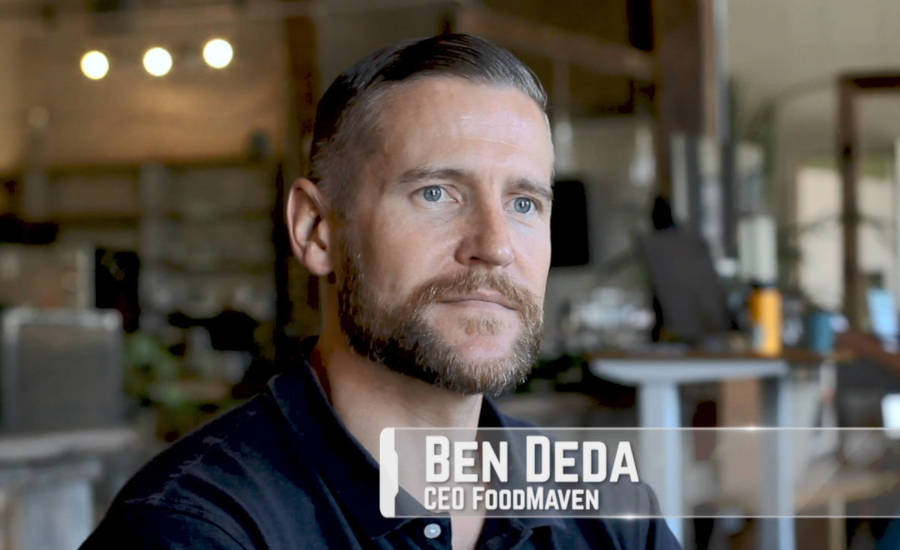
Ben Deda, CEO of FoodMaven, discusses the growth of the company’s workforce and its commitment to sustainability with Andy Haancek, editor-in-chief, in an only-only video Q&A.
With the company growing quickly and its mission catching on, Andy Hanacek, editor-in-chief of The National Provisioner, visited the company’s operations and some of its suppliers and customers in the Denver area, to dig into how the company accomplishes its mission.
During his visit, Hanacek sat down with Ben Deda, CEO of FoodMaven, to get the insights into the company’s next moves and the secret to its successes thus far. What follows is a portion of their conversation. Additionally, on the accompanying pages, you will find links to videos of Hanacek’s other visits on the tour — and you can hear directly from the interviewees how FoodMaven works with its partners and customers to be a leader in sustainability.
HANACEK: So, FoodMaven was founded three years ago to help with this problem of food waste on the supply chain level, but how is your mission, your business model different from what’s out there, if there are even other options out there?
DEDA: I think we’re probably one of the first to approach it in the holistic way that we have. Food distribution today is built for the massive, right? It’s built for big batch. You have large distributors going out with large trucks, which is really good at making sure that everybody has all the food they want, all the time. However, doing that can be pretty inefficient. Every single time we’ve talked to a new supplier, we find out that they have a product that they just can’t move, whether it’s over-supply or out of spec. Then we provide a solution for that product.
So that’s why I believe FoodMaven brings a unique and good value proposition. Having someone doing this on a massive scale in a way that really works for everyone and drives extra value for the supplier and a great value for a buyer is unique.
How FoodMaven works with processors
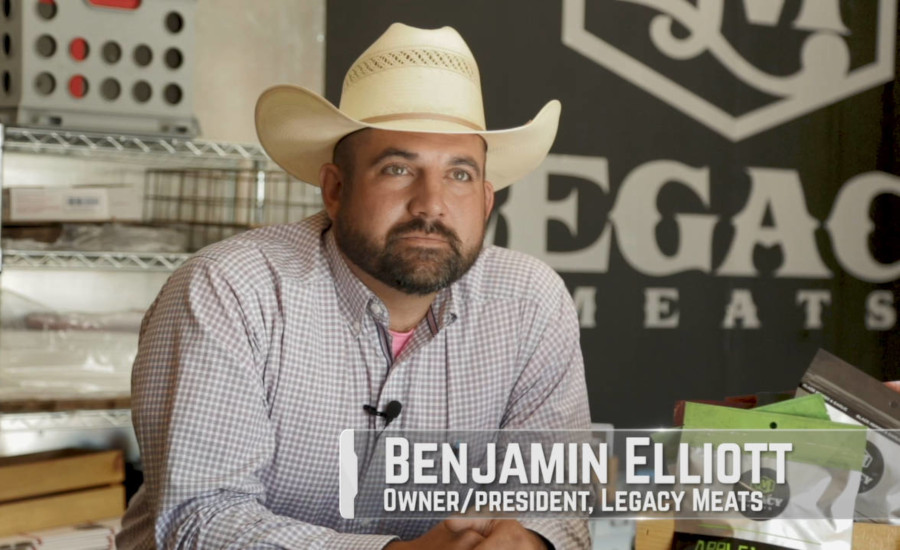
Ben Elliott, owner and president of Legacy Meats, talks about the growth of his company and how FoodMaven helps the mid-sized processor in marketing the products he produces.
HANACEK: Taking into account all segments of the food industry, where does meat fit into that spectrum of “lots of food waste” versus “little food waste”?
DEDA: Dry or shelf-stable goods obviously have quite a bit of time to get that product to somebody eventually. The ones we process the most volume from the account side is meat and produce. But even they are very different. Produce is time-based — you have to get that product through before it’s no longer good. Then, on the meat side, what you have is that dynamic around fresh versus frozen, because even though you can freeze meat to give you quite a bit of time, there’s still a bit of a stigma: “The meat’s been frozen, it’s not as good.” I think we all know, depending on when it was frozen, you probably want that product, as opposed to something that’s been sitting on a truck fresh for two weeks. So we have to approach those in slightly different ways, but they both offer great opportunities.
On the produce side, there’s the ability to get a lot of “seconds” or “ugly fruit,” and find great homes for that, especially in foodservice where it’s being processed. On the meat side it’s helping customers understand that over-supplied frozen meat can be a great opportunity to get great quality product in at a great price while making a good positive social impact.
HANACEK: Talk about FoodMaven’s growth strategy currently, and how the acquisition of Anderson Boneless Beef fit into that strategy.
DEDA: FoodMaven’s growth strategy is growth through acquisition, because there are local food distributors and processors that are looking for a potential way out of the business. Here in Colorado, Anderson Boneless Beef was a great opportunity for us to add the ability to make the over-supply, out of spec or local product better for the market. Owning a USDA-inspected facility, now we can take some of the over-supply meat we receive and change the format — making chicken we receive into cubed chicken, for example, to help our end user.
When we do these acquisitions, we maintain the business. We want to keep the revenue, the margins, the team and the customers and really just layer the FoodMaven business on top. It’s simply because there’s nothing wrong with the food you’re getting, it’s the food you’re not getting.
Get more of the story...
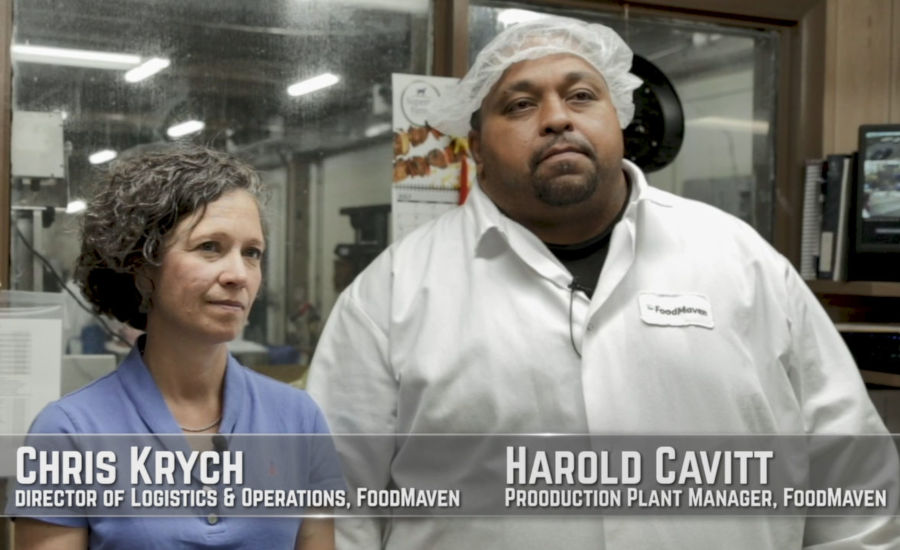
Chris Krych, director of Logistics & Operations, and Harold Cavitt, production plant manager, spent some time talking with Andy Hanacek, editor-in-chief of The National Provisioner, about the East 75th plant (formerly Anderson Boneless Beef), which FoodMaven acquired in early 2019.
Foodservice expects us to have the consistency and the quality, and we get them comfortable on the quality. Consistency is also a reason why an acquisition like Anderson was so important for us, because now they do know that we’re going to have the consistency of that product all the time. Now, they can come in to get their ground beef, their Rib-eyes, their chicken, and they can see what else we have this week.
HANACEK: Were you in the market when you acquired Anderson Boneless Beef, and how did the process of acquiring that business work out?
DEDA: We were in the market and still are. We’ve identified the top 20 or 30 different metropolitan service areas that we want to be in, finding the players in the space and different distributors, processors, and then just starting to have conversations. On Anderson Boneless Beef, we had met the previous owner a number of months ago and had some great conversations, and when everything aligned it was our first acquisition here in Colorado, in our backyard and easy to integrate because it wasn’t a plane flight away.
It’s been a good learning process. They have a great team there. We ended up acquiring a facility that’s probably around 10,000 square feet. We picked up a good customer base, a lot of great foodservice, but not much overlap with our existing customer base, so it’s been good because we’ve been able to take that Anderson product to our prior FoodMaven customer base and vice versa.
HANACEK: What does the future hold there? Are you looking to expand that or just kind of keep it where it is, and ramp up the production as much as you can? How much capacity do you have to expand within the walls?
DEDA: We’ve got some capacity today to expand, but our plan, usually when we do these acquisitions is not to expand the acquired business, it’s really to grow our impact business on top of it. So if there are opportunities to do more on the local side, which fits into our impact business, that’s something to be really excited about, and we’re seeing some good demand on the institutional side, hospitality and education.
Get more of the story...
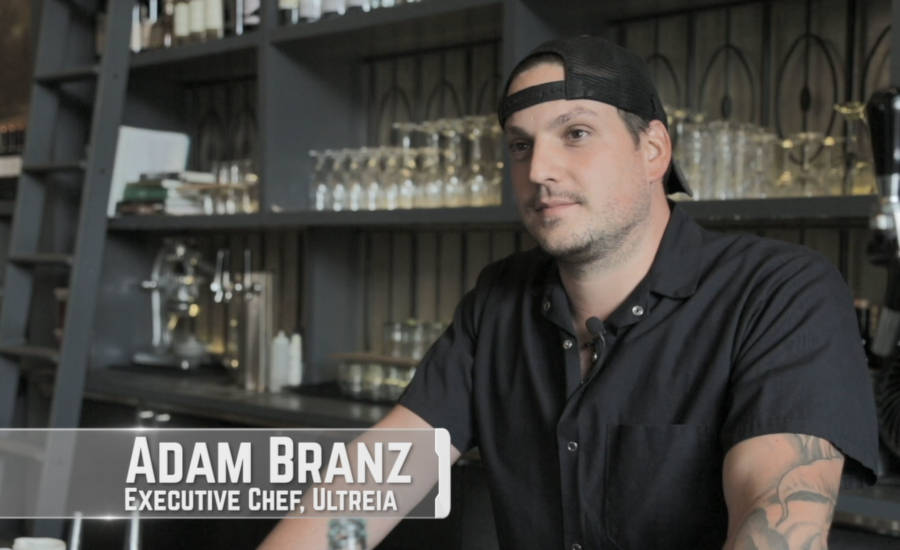
Adam Branz, executive chef, Ultreia, explains the growth of the restaurant and the ways in which Ultreia benefits from its partnership with FoodMaven.
HANACEK: Where do you think FoodMaven will expand in the future?
DEDA: Today, we’re here in Colorado, serving primarily the Front Range, though we do have some customers up in the mountains as well. Regarding our expansion plans, we’ve got some great things going on in Dallas right now. We’re hoping to be down there in the next few months, and then we’ve looked at a number of other cities as well — such as Houston, Atlanta — but definitely growing and getting into every market across the U.S. as our goal here in the next few years.
HANACEK: Does your expansion model require that you acquire and/or operate a meat-processing plant in the new markets you’re pursuing, or can you expand to new markets without securing a facility?
DEDA: I’d say meat processing is something we’re definitely open to with expansion, but it’s really just going to depend on the target. If we have a target that fits our model and looks great, and it’s simply a distributor, we can do that. If it’s one that’s has processing, we would take a look at if it fit into the business model overall too. The good thing is, as we add these additional markets, we have the ability to tap in here and potentially help move product through those as well — we can get more leverage out of the East 75th building as a processing capability. NP





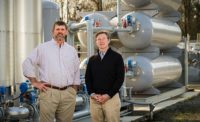
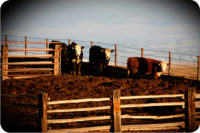
Report Abusive Comment